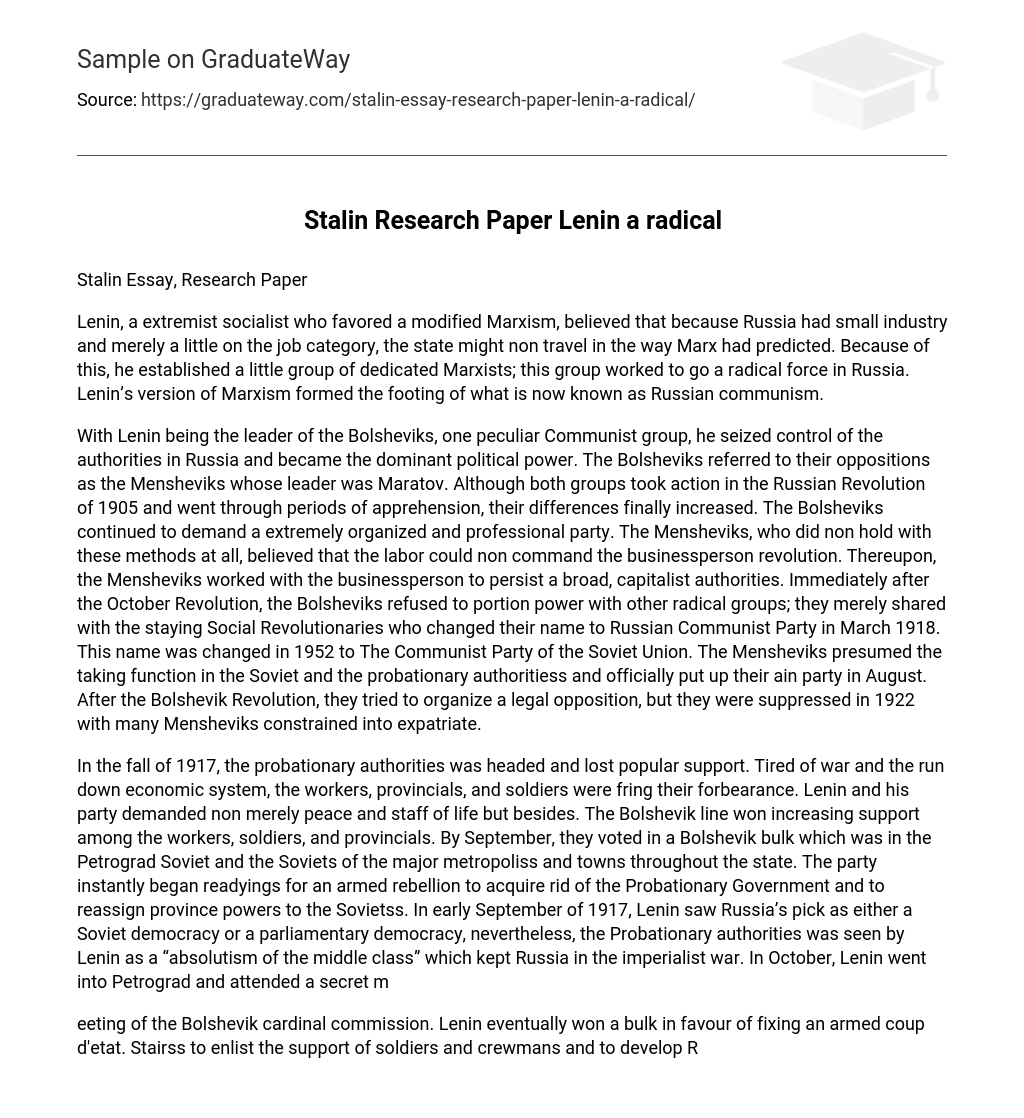Stalin Essay, Research Paper
Lenin, a extremist socialist who favored a modified Marxism, believed that because Russia had small industry and merely a little on the job category, the state might non travel in the way Marx had predicted. Because of this, he established a little group of dedicated Marxists; this group worked to go a radical force in Russia. Lenin’s version of Marxism formed the footing of what is now known as Russian communism.
With Lenin being the leader of the Bolsheviks, one peculiar Communist group, he seized control of the authorities in Russia and became the dominant political power. The Bolsheviks referred to their oppositions as the Mensheviks whose leader was Maratov. Although both groups took action in the Russian Revolution of 1905 and went through periods of apprehension, their differences finally increased. The Bolsheviks continued to demand a extremely organized and professional party. The Mensheviks, who did non hold with these methods at all, believed that the labor could non command the businessperson revolution. Thereupon, the Mensheviks worked with the businessperson to persist a broad, capitalist authorities. Immediately after the October Revolution, the Bolsheviks refused to portion power with other radical groups; they merely shared with the staying Social Revolutionaries who changed their name to Russian Communist Party in March 1918. This name was changed in 1952 to The Communist Party of the Soviet Union. The Mensheviks presumed the taking function in the Soviet and the probationary authoritiess and officially put up their ain party in August. After the Bolshevik Revolution, they tried to organize a legal opposition, but they were suppressed in 1922 with many Mensheviks constrained into expatriate.
In the fall of 1917, the probationary authorities was headed and lost popular support. Tired of war and the run down economic system, the workers, provincials, and soldiers were fring their forbearance. Lenin and his party demanded non merely peace and staff of life but besides. The Bolshevik line won increasing support among the workers, soldiers, and provincials. By September, they voted in a Bolshevik bulk which was in the Petrograd Soviet and the Soviets of the major metropoliss and towns throughout the state. The party instantly began readyings for an armed rebellion to acquire rid of the Probationary Government and to reassign province powers to the Sovietss. In early September of 1917, Lenin saw Russia’s pick as either a Soviet democracy or a parliamentary democracy, nevertheless, the Probationary authorities was seen by Lenin as a “absolutism of the middle class” which kept Russia in the imperialist war. In October, Lenin went into Petrograd and attended a secret m
eeting of the Bolshevik cardinal commission. Lenin eventually won a bulk in favour of fixing an armed coup d’etat. Stairss to enlist the support of soldiers and crewmans and to develop Red Guards readily continued under the visual aspect of self-defence of the Petrograd Soviet. In early November, the Bolsheviks led ruddy guards and radical soldiers while crewmans overthrew the probationary authorities and proclaimed that province power had gotten into the custodies of the Sovietss. At this point, the Bolsheviks constituted the absolute bulk of the Second All-Russia Congress of Soviets. The delegates voted to accept full power and to elected Lenin as president of the council of people’s commissars; the new Soviet authorities approved his peace and land edict.
In January 1924, after Lenin’s decease, Joseph Stalin rapidly gained power; he wanted the Soviet Union to set up a operable political system without anticipating support from the world-wide revolution. The Secretary General started a policy of
“Socialism in one state”. In 1928, Stalin abandoned Lenin’s New Economic Policy because of the hotheaded province organized industrialisation under a sequence of five-year programs. In late 1934, the Secretary General started a new run of political panic against the communist members who had antecedently brought him into power. Stalin’s chief cause was the blackwash of Sergey Kirov and he used the show test of taking Communists as a agency of spread outing new panic in the state.
Kirov played an of import function in the reign of Stalin. In 1926, Stalin transferred Kirov to Leningrad to head the Leningrad party organisation. Kirov was besides made a candidate member of the politburo of 1926. And after loyally back uping Stalin against his oppositions, he was elected into the politburo. Kirov started the modernisation and growing of the metropolis of Leningrad’s industry. Although he appeared to be a Stalinist, Kirov demonstrated increasing independency in directing the activities of his Leningrad organisation in the early 1930’s. He bit by bit began to presume a place of power that rivaled that of Stalin; accordingly, this led to his blackwash. Because Stalin had an copiousness of Alliess, back uping parties, and secret constabulary, the members of other parties were non able to subvert Stalin.
Undoubtedly, Lenin is the cause for the constitution of the violent dictatorship that followed his decease, and it was his protagonists that instantly became powerful after his decease. These peculiar leaders took advantage of their power which accordingly led to black terrorist act. Because of their petroleum and indecorous political determinations, it is hard to hold regard for any of these work forces.





